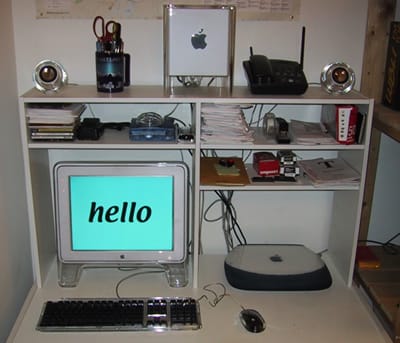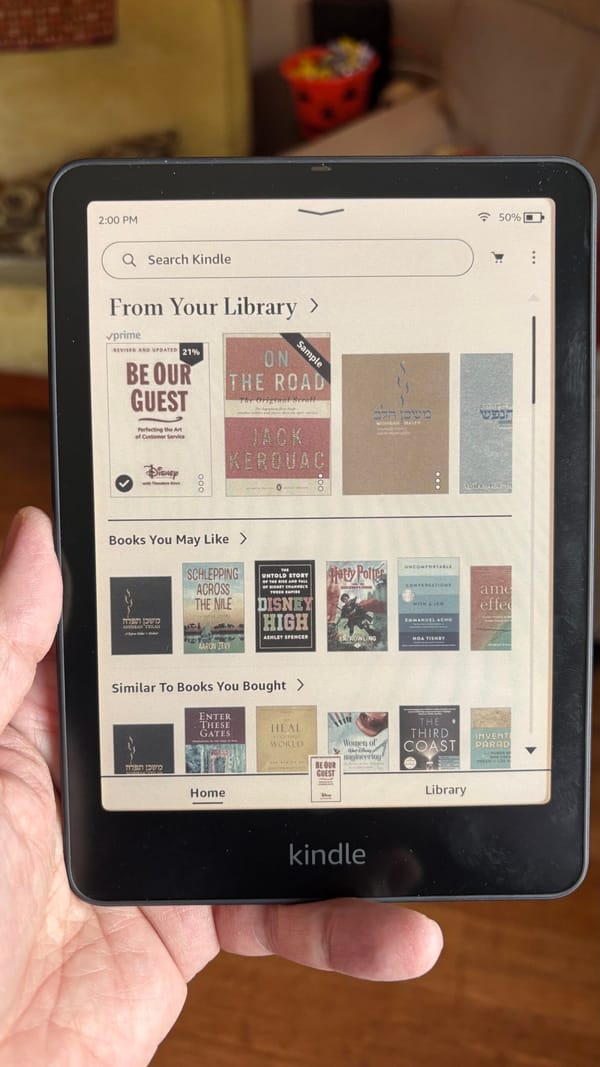I'm Not a Mac #4--Control Issues: Why Apple Doesn't Want You to Use Linux
I dove into Linux at the suggestion of several commenters who urged me to take a look at the open-source end of the OS world before deciding to go over to the Microsoft dark side. Why not? I figured. One-half of my goal is never again to have to pay several hundred extra dollars for specially brande

This post is part of my "I'm Not a Mac" series, chronicling my controversial migration away from Apple Computer after 15 years as a Mac user. Find other entries in the "I'm Not a Mac" series archive.
[Welcome to new readers from Free Software Daily, LinuxToday, Tuxmachines.org, and other places. Thank you for clicking through.]
Boy, what a tempest I discovered when I posted last week about my disillusionment with Apple Computer and my ongoing migration from OS X to the new and well-reviewed Windows 7. Last time I checked in, I had jailbroken my iPhone to install the unofficial Google Voice mobile app. (You can find all my updates in my Migration from Mac OS X post category.) This week I've been taking a closer look at Linux--and discovered yet another Apple tentacle wrapped around my right to choose my own OS: iTunes, and Apple's ongoing refusal to port it to Linux.
I dove into Linux at the suggestion of several commenters who urged me to take a look at the open-source end of the OS world before deciding to go over to the Microsoft "dark side." Why not? I figured. One-half of my goal is never again to have to pay several hundred extra dollars for specially branded hardware just to run my OS of choice, and the other half is to remove myself from Steve Jobs' heavy-handed control of the applications I choose to install there.
Now, Linux is to Apple the way that Protestantism is to Catholicism: there's little secretive mysticism, and lots of free choice. Most surprising to newbies like me, there is no single "official" version of the OS. Instead, dozens of freely available, mostly open-source distributions of the software exist, each aiming to satisfy a different set of users, and most installable on almost any machine.
I started out playing with popular "distros" Ubuntu and Kubuntu, but found both a bit clunky (Ubuntu seemed pretty plain to look at, and Kubuntu's interface was needlessly confusing.) I like an OS that's pretty but unobtrusive, and apparently I'm also a "home user tinkerer who likes my multimedia files to play out of the box." (I took this test to find that out.) So yesterday I started exploring Linux Mint, an OS based on Ubuntu designed to be minimalist yet snazzy.
At first glance, the crisp-looking interface backs up Mint's slogan, "From freedom came elegance." I won't tell you I installed the thing, because the version of Mint I explored (there are others) includes proprietary drivers that conflict with U.S. copyright law. Unlike other OSes, in Linux, programs cost nothing, are downloaded from safe, virus-free central repositories, and work across multiple OS versions.
Unfortunately, the same can't be said for hardware compatibility. A browse through the Ubuntu and Mint forums told me that late-model Mac users have had problems getting basic hardware components to work with Linux, including critical things like Wifi cards. The reason? Use of proprietary drivers by Apple that don't have direct workarounds. It's the same reason that you can't play mp3s and DVDs out of the box with most versions of Linux--you have to download and perhaps pay to use the drivers that give you the "right" to access your own media.
Even with the that problem solved in the don't-use-me-in-the-U.S. version of Linux Mint, there still remains one big hurdle to my ability to consider Linux a potential new OS: iTunes. It's 2009 and Apple still refuses to port the world's leading media player and online media distribution channel to Linux. That leaves no native way for Linux users to sync iPods and iPhones.
The Linux user forums suggest that Apple likes it this way. Linux is open source, its users prefer to control their own software and rights decisions. Even without DRM on iTunes Store music any longer, Apple could never hope to control how people chose to use a Linux port of the media player. Thus, no iTunes.
Even worse, although there have been workarounds developed over the years, including running iTunes via Windows virtualization (WINE software) and using third-party apps to at least get music and photos onto the phone manually, in the latest iPhone OS release (3.0+), Apple deliberately altered the phone's file structure to render it incompatible with Linux workarounds.
These are the same control-freaky shenanigans on the part of Apple that have me wanting to part ways with the company and its computing solutions in the first place. Think about that--Apple thumbing its nose at a community of millions of alternate OS users simply because it can't control how they use their own computers.
If I wanted to switch to Linux and keep my iPhone, I would either have to also keep a backup computer running Mac OS X to sync my phone (not an optimal option), delay my switch until Linux developers came up with another workaround...or simply migrate directly to Windows 7, where iTunes already exists. It's amazing that a decision by Apple might force me directly into the Microsoft camp, bypassing the equally Microsoft-unfriendly, open-source community that, if Apple had any sense, would be seen as an ally in its competition with the Windows world rather than an afterthought.
I guess if you're leaving the fold, Steve Jobs would rather you stay somewhere he and his company can keep tabs on you (and remotely brick your iPhone for being naughty, if desired.) This recent PC World article [Editor's Note: link fixed] talks about Apple's deliberate strategy of locking Mac users into proprietary software and hardware that make it difficult to migrate to another operating system if ever they decided to do so. After all, a highly captive user base means a guaranteed income stream from future iPod and MacBook purchases. The magazine's top two Apple "gotchas"? iTunes and iPods/iPhones.
Apple's brand of one-way trip marketing sounds a lot like a cult to me. Or that scary fish from Finding Nemo where you're attracted to the shining light, only to be devoured upon coming too close the the shadow-shrouded jaws. Perhaps even the bits and bytes version of a roach motel. Yes, I'm that over Cupertino at this point.
Ultimately, I couldn't care less about iTunes in and of itself. I'll eventually own an Android phone and there are third-party syncing solutions for Google's phone platform on all three major OSes. But for right now, I'm annoyed. Apple's ongoing attempt to control the OS choice of former users by trying to steer them clear of Linux is mean-spirited. Every time I encounter another such element of Apple's deeply entrenched strategy to control its own users--and apparently, its former users, too--all it does is stiffen my resolve to get the heck off this computing platform once and for all after a decade and a half of use.
And perhaps scrub myself with a robust loofa to get rid of the stench of the Jobs years while I'm at it.




